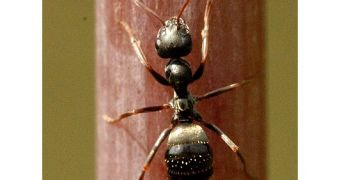A new research carried out by the University of Exeter has concluded that ants have a very big impact on the ecosystem they live in, because of their 'ecosystem engineers' and predator skills.
The study was conducted in Germany, where it focused on the impact of the presence of different combinations and densities of black garden ants (Lasius niger) and common red ants (Myrmica rubra).
Study results showed that ants have two effects on their local environment: first of all, through moving of soil by nest building activity and by collecting food, they affect the level of nutrients within.
This indirectly impacts the local populations of many animal groups, from decomposers like the Collembola, to species way up the food chain.
Second of all, the ants prey on a wide range of other animals, even bigger prey, that they attack in large numbers.
So, a low density of ants in a certain area, increased the diversity and density of other animals, especially herbivores and decomposers, whereas at higher densities, the ants had no or the opposite effect, which means that their predatory character counteracts the positive influence.
“Ants are very effective predators which thrive in huge numbers,” said Dirk Sanders, an author of the study from the university's Center for Ecology and Conservation.
“They're also very territorial and very aggressive, defending their resources and territory against other predators.
“All of this means they have a strong influence on their surrounding area.
“In this research, we studied for the first time how big this impact is and the subtleties of it.
“What we found is that despite being predators, their presence can also lead to an increase in density and diversity of other animal groups.
“They genuinely play a key role in the local environment, having a big influence on the grassland food web.”
“What we find is that the impact of ants on soil nutrient levels has a positive effect on animal groups at low levels, but as the number of ants increases, their predatory impacts have the bigger effect – thereby counteracting the positive influence via ecosystem engineering,” added Dr Frank van Veen, another author on the study.
This research was financially supported by the German Research Council, and was published in the Journal of Animal Ecology.

 14 DAY TRIAL //
14 DAY TRIAL //